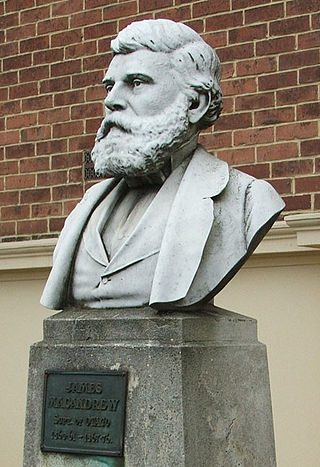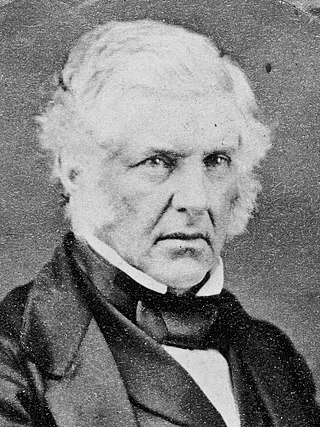
James Macandrew was a New Zealand ship-owner and politician. He served as a Member of Parliament from 1853 to 1887 and as the last Superintendent of Otago Province.
The 2nd New Zealand Parliament was a term of the Parliament of New Zealand. It opened on 15 April 1856, following New Zealand's 1855 election. It was dissolved on 5 November 1860 in preparation for 1860–61 election. The 2nd Parliament was the first under which New Zealand had responsible government, meaning that unlike previously, the Cabinet was chosen by Parliament rather than by the Governor-General of New Zealand.

Thomas Dick was a 19th-century New Zealand politician. Originally a merchant, he worked in London and then represented his firm on Saint Helena for seven years. From there, he was sent to Dunedin as the company's representative; he emigrated with an extended family. He soon became involved in politics and was Superintendent of Otago Province from 1865 until 1867. Over a period of 24 years, he represented various Dunedin electorates in Parliament and was Colonial Secretary (1880–1884), Minister of Justice from 1881 to 1882, and Minister of Education from 1881 to 1884. A deeply religious man, he was involved in many church affairs. He was one of the founders of Hanover Street Baptist Church; the building is now classified as Category I by Heritage New Zealand.
Bruce was a rural parliamentary electorate in the Otago region of New Zealand, from 1861 to 1922. For part of the 1860s with the influx to Otago of gold-miners it was a multi-member constituency with two members.
Chalmers, originally Port Chalmers, was a parliamentary electorate in the Otago Region of New Zealand, from 1866 to 1938 with a break from 1896 to 1902. It was named after the town of Port Chalmers, the main port of Dunedin and Otago.
Caversham was a parliamentary electorate in the city of Dunedin in the Otago region of New Zealand, from 1866 to 1908.
Dunedin Country was a parliamentary electorate in the rural area surrounding the city of Dunedin in Otago, New Zealand, from 1853 to 1860. It was a two-member electorate and was represented by a total of five members of parliament.
City of Dunedin, during the first two parliaments called Town of Dunedin, was a parliamentary electorate in Dunedin in Otago, New Zealand. It was one of the original electorates created in 1853 and existed, with two breaks, until 1905. The first break, from 1862 to 1866, was caused by an influx of people through the Otago gold rush, when many new electorates were formed in Otago. The second break occurred from 1881 to 1890. It was the only New Zealand electorate that was created as a single-member, two-member and three member electorate.
Dunedin and Suburbs South was a parliamentary electorate in the city of Dunedin in Otago, New Zealand from 1862 to 1866. From 1863 it was a multi-member electorate.
The 3rd New Zealand Parliament was a term of the Parliament of New Zealand. Elections for this term were held between 12 December 1860 and 28 March 1861 in 43 electorates to elect 53 MPs. Two electorates were added to this during this term, Gold Fields District and a new Dunedin electorate created by splitting the existing City of Dunedin into Dunedin and Suburbs North and Dunedin and Suburbs South, increasing the number of MPs to 57. During the term of this Parliament, six Ministries were in power.
George Hepburn was a 19th-century Member of Parliament from Otago, New Zealand. Born in Scotland he emigrated to New Zealand in 1850. He first entered politics by serving on the Provincial Council of Otago from 1855 to 1865 before he was elected to the New Zealand House of Representatives as member for Roslyn in 1866.

The Town of Christchurch by-election in 1860 was triggered by the resignation of Richard Packer as the Member of the House of Representatives for the Town of Christchurch electorate, and occurred during the term of the 2nd New Zealand Parliament. The previous representative of the electorate, the politician Henry Sewell, had returned after three years in England and the general expectation was that Sewell would be the sole contender for election. The Lyttelton Times wrote several provocative editorials, generally endorsing Sewell for his obvious ability, but criticising him for not publicly talking about his policies and plans. Sewell eventually arranged a public meeting the evening prior to nomination day; this was the only public meeting during the election campaign. After a lengthy address, which was favourably received by the Lyttelton Times, a second contender for the office put his name forward at that meeting: the publican Michael Hart. Sewell, a former premier and one of New Zealand's most senior politicians at the time, was successful against the political novice Hart.

The Dunedin Country by-election 1858 was a by-election held in the multi-member Dunedin Country electorate during the 2nd New Zealand Parliament, on 16 June 1858. The by-election was caused by the resignation of incumbent MP John Cargill and was won by John Taylor.

The 1865 Town of New Plymouth by-election was a by-election held in the Town of New Plymouth electorate during the 3rd New Zealand Parliament, on 19 May 1865. The by-election was caused by the resignation of the incumbent, Charles Brown, and was won unopposed by Henry Sewell. Whilst Sewell was not a local resident, he was a member of the government through his appointment to the Legislative Council, the upper house of Parliament. Sewell accepted the invitation to represent the electorate, as him becoming a member of the lower house was seen to strengthen the government.
The Dunedin Country by-election 1860 was a by-election held in the multi-member Dunedin Country electorate during the 2nd New Zealand Parliament. The by-election was caused by the resignation of incumbent MP William Cargill. The nomination meeting was held on 28 March and as Thomas Gillies was the only person proposed, he was declared elected unopposed.
The Bruce by-election 1862 was a by-election held in the multi-member Bruce electorate during the 3rd New Zealand Parliament, on 31 July 1862. The by-election was caused by the death of incumbent MP Charles Kettle on 5 June, and was won by Edward Cargill.
William John Dyer was a New Zealand businessman and politician. Born in London, his family moved to Sydney when he was a child. He ran a trading business between Sydney, New Zealand and the Pacific Islands, and moved to New Zealand in 1857. He lived at different times in Dunedin and Milton and entered politics, contesting a number of elections and representing the Tokomairaro electorate in the provincial council.
The April 1865 Bruce by-election was a New Zealand by-election held in the multi-member electorate of Bruce during the 3rd New Zealand Parliament on 8 April 1865. It was triggered on 9 January that year by the resignation of separationist Thomas Gillies and won by prominent settler Arthur John Burns. The more liberal businessman William John Dyer was the sole other contester of the by-election, finishing with 43.33% of the vote.
The July 1865 Bruce by-election was a New Zealand by-election held in the electorate of Bruce during the 3rd New Zealand Parliament on 27 July 1865 triggered by the resignation of Edward Cargill. Three candidates were nominated but one of them withdrew during the nomination meeting. James Macandrew was the successful candidate; he defeated John Cargill, a former Member of Parliament and a brother of the incumbent.
The 1862 City of Dunedin by-elections were three by-elections held in the City of Dunedin electorate in Dunedin following three resignations.





